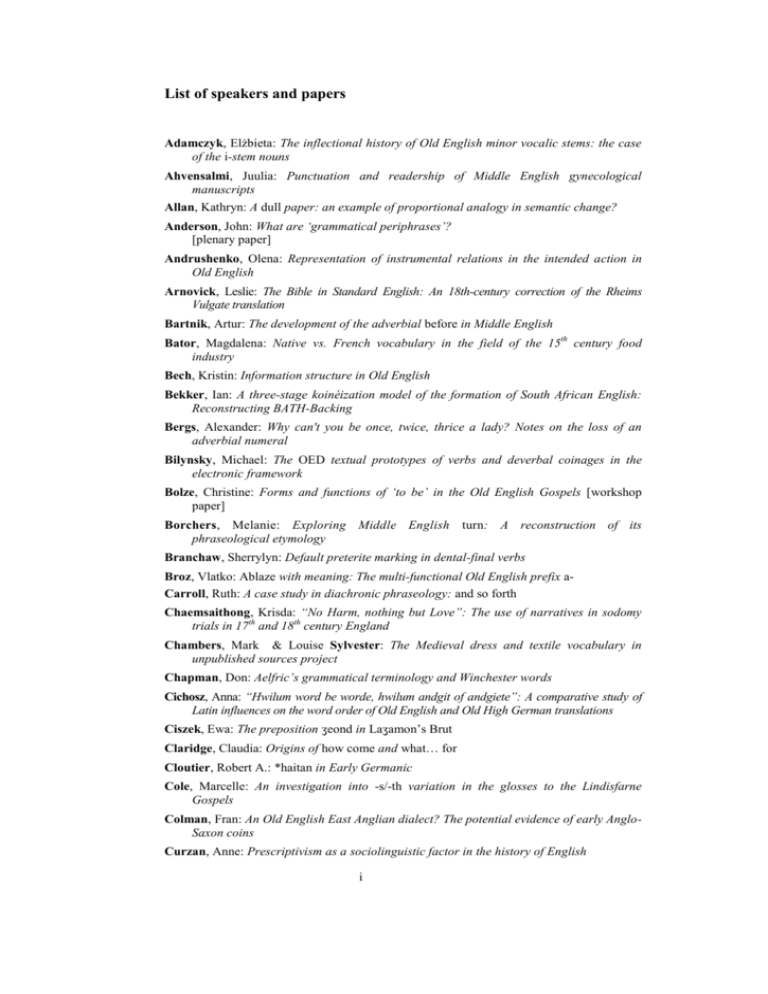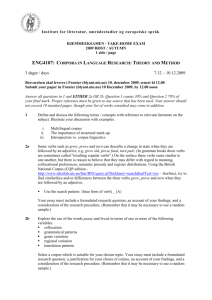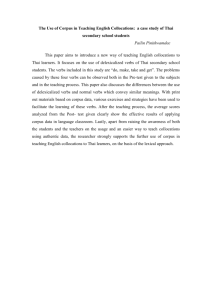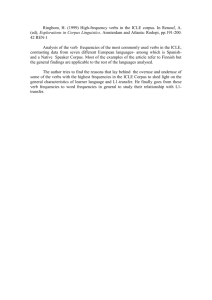Elżbieta Adamczyk (adame@ifa
advertisement

List of speakers and papers Adamczyk, Elżbieta: The inflectional history of Old English minor vocalic stems: the case of the i-stem nouns Ahvensalmi, Juulia: Punctuation and readership of Middle English gynecological manuscripts Allan, Kathryn: A dull paper: an example of proportional analogy in semantic change? Anderson, John: What are „grammatical periphrases‟? [plenary paper] Andrushenko, Olena: Representation of instrumental relations in the intended action in Old English Arnovick, Leslie: The Bible in Standard English: An 18th-century correction of the Rheims Vulgate translation Bartnik, Artur: The development of the adverbial before in Middle English Bator, Magdalena: Native vs. French vocabulary in the field of the 15th century food industry Bech, Kristin: Information structure in Old English Bekker, Ian: A three-stage koinéization model of the formation of South African English: Reconstructing BATH-Backing Bergs, Alexander: Why can't you be once, twice, thrice a lady? Notes on the loss of an adverbial numeral Bilynsky, Michael: The OED textual prototypes of verbs and deverbal coinages in the electronic framework Bolze, Christine: Forms and functions of „to be‟ in the Old English Gospels [workshop paper] Borchers, Melanie: Exploring Middle English turn: A reconstruction of its phraseological etymology Branchaw, Sherrylyn: Default preterite marking in dental-final verbs Broz, Vlatko: Ablaze with meaning: The multi-functional Old English prefix aCarroll, Ruth: A case study in diachronic phraseology: and so forth Chaemsaithong, Krisda: “No Harm, nothing but Love”: The use of narratives in sodomy trials in 17th and 18th century England Chambers, Mark & Louise Sylvester: The Medieval dress and textile vocabulary in unpublished sources project Chapman, Don: Aelfric‟s grammatical terminology and Winchester words Cichosz, Anna: “Hwilum word be worde, hwilum andgit of andgiete”: A comparative study of Latin influences on the word order of Old English and Old High German translations Ciszek, Ewa: The preposition ʒeond in Laʒamon‟s Brut Claridge, Claudia: Origins of how come and what… for Cloutier, Robert A.: *haitan in Early Germanic Cole, Marcelle: An investigation into -s/-th variation in the glosses to the Lindisfarne Gospels Colman, Fran: An Old English East Anglian dialect? The potential evidence of early AngloSaxon coins Curzan, Anne: Prescriptivism as a sociolinguistic factor in the history of English i Cuyckens, Hubert & Christopher Shank: Variation and change in the distribution between that-clauses and gerundial clauses as verb complements Davies, Mark: The 300 million word Corpus of Historical American English (1810-2009): A new tool for in-depth research on Late Modern English Defour, Tine: Truth identifiers and intensifiers: tracing the diachronic steps of verily, truly and really DeLazero, Octav Eugen: Modal adjectives in the history of English Demmen, Jane & Ursula Lutzky: Pray in Early Modern English drama De Smet, Hendrik: The diffusion of ing-complements in English De Smet, Hendrik, Hans-Jürgen Diller & Jukka Tyrkkö: A database of English electronic texts: Demonstration and discussion of compilation and classification principles Diewald, Gabriele & Ilse Wischer: Markers of futurity in Old High German and Old English: A comparative corpus-based study [workshop paper] Diller, Hans-Jürgen: Emotion vs. passion: The history of word-use and the history of concepts Diller, Hans-Jürgen, Hendrik De Smet & Jukka Tyrkkö: A database of English electronic texts: Demonstration and discussion of compilation and classification principles Dolberg, Florian: Gender change in Late Old / Early Middle English Dollinger, Stefan: New data for an English usage puzzle: the long history of spelling variation in Canadian English and its linguistic implications Dreschler, Gea: The changing role of the subject after the loss of verb-second [workshop paper] Durkin, Philip: What should the parameters be for a survey of borrowing in Renaissance English? Egan, Thomas: Prefer: the odd verb out Eitelmann, Matthias: Remembering gemunan: On the semantics and functional loss of the „mnemonic preterite-present‟ Eitler, Tamás: Conservative Northern English? A language contact explanation for the retention of dative plural –um in northern OE and ME Fabiszak, Małgorzata & Anna Hebda: The emotion talk of hope in the history of English: A corpus study Fernández Cuesta, Julia: The resilience of the Northern Subject Rule in 1st person sg. contexts in Early Modern English wills and testaments Fodor, Alexandra: Conditional or not conditional? A diachronic corpus-based study of abbreviated if-structures Gardela, Wojciech: Subject-verb agreement in a selection of the late 14th and the 15th century texts González-Díaz, Victorina: Her shoes were perpetually slipping off: the progressive in the Age of Sensibility Haselow, Alexander: Go on, then. - The development of sentence-final then into a modal particle Hebda, Anna & Małgorzata Fabiszak: The emotion talk of hope in the history of English: A corpus study Hebing, Rosanne: The rise of the progressive in Middle English: verbs, events, and their aspect [workshop paper] ii Hotta, Ryuichi: What determined the schedule of the s-plural diffusion in southern dialects of Early Middle English? Huber, Judith: "And no man entreth in or out" – how are 'unfitting' French motion verbs integrated into English? Illés, Theresa-Susanna: Reconsidering Celtic influence on ME relative clauses – a corpusbased analysis Ingham, Richard: Contact influence of French on English: the Modal + „have‟ auxiliary Juvonen, Teo: The function of the possessive morpheme in relation to the possessive pronouns in various text types in Late Middle and Early Modern English Kalaga, Aleksandra: Lexical conversion in Shakespeare‟s language Kazmierski, Kamil & Nikolaus Ritt: The influence of morphology on the evolution of English phonotactics Kida, Ireneusz: Ambivalent para-hypotactic structures in annotated corpus linguistics Kiełtyka, Robert: Verbal zoosemy from a panchronic perspective Kijak, Artur: English intrusive liquids Kilpiö, Matti: Causative habban in Old English [workshop paper] Kranich, Svenja: “I feel I am understanding it more now.” A web-based study of stative verbs in the progressive in PDE Kristó, László: On the phonology of Old English weak verbs: A Strict CV approach Lavidas, Nikolaos: Null objects in the diachrony of English Łęcki, Andrzej M.: A quantitative analysis of the development of whether in Mediaeval English Łodej, Sylwester: The demise of Gog and its phraseology in dramatic discourse: a study into historical pragmatics of a tabooistic distortion Los, Bettelou: Historical linguistics meets psycholinguistics: evidence for a typological switch in early Modern English? [workshop paper] Loureiro-Porto, Lucía: The þurfan / need replacement: Has morphological productivity anything to do with it? Lowrey, Brian: Middle English causatives and complement types Lutz, Angelika: Norse influence on English in the light of general contact linguistics [plenary paper] Lutzky, Ursula & Jane Demmen: Pray in Early Modern English drama Mailhammer, Robert & Elena Smirnova: Sprung from a common source? The sources of passive constructions in English and German [workshop paper] Mannila, Heikki, Terttu Nevalainen & Helena Raumolin-Brunberg: Time‟s arrow reversed? Progressive vs. conservative individuals in real-time language change Marcus, Imogen: Syntactic structure in Elizabeth Talbot‟s letters, with reference to the conjunction and Marttila, Ville: 'Gode', 'faire' and 'fresshe' food: Adjectives and their collocation patterns in Middle English culinary recipes of the Potage Dyvers family Matsumoto, Meiko: Progressive forms in Early Modern English McManus, Jennifer: Attenuating degree modifiers: examining English rather Moessner, Lilo: The emergence of domain-specific styles in scientific writing Molencki, Rafał: Providing/Provided that: Grammaticalization or loan translation? Nakamura, Fujio: A history of the Auxiliary do Occurring in Affirmative Imperatives in Late Modern English iii Nakayasu, Minako: Modals, speech acts and (im)politeness: A new look at interactions in Shakespeare‟s plays Nevala, Minna: A bit of this and that: On social identification in early English Nevalainen, Terttu, Helena Raumolin-Brunberg & Heikki Mannila: Time‟s arrow reversed? Progressive vs. conservative individuals in real-time language change Newman, John G.: The effects of analogy and token frequency on allomorphy in the plural morpheme of Old English disyllabic neuter a-stem nouns Nielsen, Hans Frede: The Germanic roots of the Old English sound system [plenary paper] Nykiel, Jerzy: On concessive markers developed in Middle English: notwithstanding and maugre Oda, Toshihiro: The Stressed Syllable Law in the diachronic stages of English as a counterevidence of Preference Laws: phonetic bases and the shift from syllabic to prosodic approaches Okulska, Urszula: Building social identities of early English governing elites and developing early English institutions through the discourse of 15-17th-century public correspondence Osawa, Fuyo: The Loss of Lexical Case in the History of English: What is behind “Transitivation”? Palander-Collin, Minna: Person reference in early advertisements Palmer, Chris C.: Borrowed derivational morphology and perceived productivity in English letters, 1400-1600 Parra-Guinaldo, Víctor: Grammaticalization of OE whether in the Left Periphery Pawlowitsch, Christina: The emergence of the Modern English system of stress assignment: a game-theoretical approach Petré, Peter: The decline of weorðan in English versus the grammaticalization of werden in German [workshop paper ] Petré, Peter: Weorðan „become‟ and begin as indicators of the unbounded to bounded shift in English [workshop paper] Pfaff, Meike: What you want to do is not tell me what I want to do. On the development and pragmatics of want to as a quasi-modal Phillips, Betty: “þa næhstu æreste & þa eristu næhstu”: ǣ ~ ē in the Rushworth1 Glosses Pődör, Dóra: Early borrowings between English and Celtic Pons-Sanz, Sara M.: Northern Early Middle English texts: A linguistic analysis Raumolin-Brunberg, Helena, Terttu Nevalainen & Heikki Mannila: Time‟s arrow reversed? Progressive vs. conservative individuals in real-time language change Rissanen, Matti: Grammaticalisation, contact and corpora: on the development of adverbial subordinators in English [plenary paper] Ritt, Nikolaus: High vowels in Middle English vowel lengthening and the avoidance of morphotactic ambiguity Ritt, Nikolaus & Kamil Kazmierski: The influence of morphology on the evolution of English phonotactics Robinson, Justyna A.: On using shallow time depth evidence in historical semantics Rodriguez-Puente, Paula: I'll ring you or I'll ring you up? A preliminary approach to the semantics of English phrasal verbs Rogos, Justyna: Litteral substitution sets in d-MSS of the “Man of Law‟s Tale” iv Romero, Celine: «Doubleness» in Middle English: modals and complementizers Ruano-García, Javier: Bridging the gaps of early modern regional lexis: The case of White Kennett‟s Etymological Collections of English Words and Provincial Expressions Rutkowska, Hanna: Graphemic and orthographic developments in the early editions of The kalender of shepherdes Sądej, Kinga & Marta Sylwanowicz: Cleanliness is next to godliness: the lexis of personal hygiene and beauty in Old and Middle English Salmi, Hanna: Text-organising devices and interaction in The Owl and the Nightingale Sánchez-García, Pilar: The Westmoreland dialect in Three Dialogues (1790): The contribution of Ann Wheeler‟s Dialogues to Joseph Wright‟s The English Dialect Dictionary Schultz, Julia: Twentieth-century borrowings from French into English Shank, Christopher & Hubert Cuyckens: Variation and change in the distribution between that-clauses and gerundial clauses as verb complements Shibasaki, Reijiro: Please tilt me-ward by return of post: A marginal pronominal construction revisited Shibasaki, Reijiro: From head-marking to dependent-marking in the early English pronominal paradigm: A case of degrammaticalization? Sims, Lynn & Elly van Gelderen: Aspectual cycles: the history of English inceptives Skorasińska, Monika: A comparative study of shall and will in Shakespeare's and Marlowe's tragedies Smirnova, Elena & Robert Mailhammer: Sprung from a common source? The sources of passive constructions in English and German [workshop paper] Sommerer, Lotte: Old English bare NPs in definite contexts Stewart, Lauren: „Aus we do in Scotlaun...‟: Dialect representation in Courtship a la Mode (1700) Studer, Dieter: Shedding light on Old English dry-point glosses Studer-Joho, Nicole: The development of OE /ɑ:/ > ME /ɔ:/ in lightly stressed words Suhr, Carla: “A most vvicked worke of a wretched Witch”: Attitude in Early Modern English witchcraft pamphlets Suzuki, Daisuke: The historical development of No sooner … than and its semantic change Sylvester, Louise & Mark Chambers: The Medieval dress and textile vocabulary in unpublished sources project Sylwanowicz, Marta & Kinga Sądej: Cleanliness is next to godliness: the lexis of personal hygiene and beauty in Old and Middle English Taavitsainen, Irma: NOW: A topic shift marker in late medieval and early modern medical writing Tacho, Elisabeth: Plundering, pillaging & foraging. Linguistic innovations in times of war. A case study Tanabe, Harumi: The comment clause in Late Middle and Early Modern English correspondence: Gender difference Tanskanen, Sanna-Kaisa: Selling the anti-Catholic ideology: a critical analysis of Henry Care‟s political rhetoric Thim, Stefan: New native prefixes in Middle English Timofeeva, Olga: Verbs of perception and cognition in Old Germanic: a corpus study of complementation patterns [workshop paper] Tissari, Heli: Literal to metaphorical bounded landmarks: On the prepositions in and into in Early Modern English v Tyrkkö, Jukka: Signs, symptoms and observations during the Enlightenment Tyrkkö, Jukka, Hendrik De Smet & Hans-Jürgen Diller: A database of English electronic texts: Demonstration and discussion of compilation and classification principles Van de Velde, Freek: Extension in the peripheral modifier slot: a constructional approach to noun phrase modification Van Gelderen, Elly & Lynn Sims: Aspectual cycles: the history of English inceptives Vennemann, Theo: Why are English and German different? On gain and loss of verbal categories in language contact [workshop paper] Vezzosi, Letizia: The role of gender-assignment as a marker of Different Object Marking Von Mengden, Ferdinand: “Degrammaticalization” and mechanisms of upgrading changes Wallage, Phillip: Quantifying the effect of the development of negative auxiliaries on the distribution of periphrastic do in negative clauses Wawrzyniak, Agnieszka: The semantic analysis of OE munan Węgrzyn, Daniel: The grammar of compound adjectives in Shakespeare‟s word-formation: corpus analysis Wełna, Jerzy: The temporal and regional contexts of the fates of the numeral two Werthmüller, Gyöngyi: Word-final -e in ME verse, with focus on Gower Williams, Graham T.: „yr Scribe Can proove no nessecarye Consiquence for you‟?: The linguistic implications of using a scribe in Early English correspondence Wischer, Ilse & Gabriele Diewald: Markers of futurity in Old High German and Old English: A comparative corpus-based study [workshop paper] Yaguchi, Michiko: Nominalization of there in existential sentences Yoshikawa, Fumiko: Discourse strategies in Margery Kempe‟s Descriptions of her Pilgrimages vi






